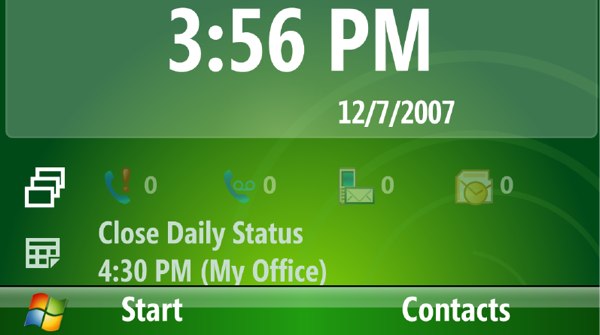While Microsoft was preoccupied with its conquest for desktop supremacy, something crazy happened. They called it the mobile revolution. This was when the notion that an iPod was only a music player and a computer was only something used at a desk quickly faded away. It was a time when devices were getting smaller, smarter, and sexier. Microsoft, unfortunately, didn’t get the memo.
Apple did. Apple took control of mobile with the iPod Touch and the iPhone, notebooks with Macbook/Macbook Pros, digital distribution with iTunes, and third-party developers with the iOS ecosystem. Everything Apple did right, Microsoft didn’t do at all.
The only company that offered a challenge to Apple during this computing revolution wasn’t Research In Motion, Dell, Palm, IBM, Sony, or any other consumer electronics manufacturers; Microsoft, for who knows what reason, was also unable to open its eyes and realize the disaster that Windows Mobile had become. But Google — of all the companies — stepped up to the plate and batted a homerun with Android. Microsoft sat on the sideline and waited for the world to pass them by.
Now we are left with four companies that have potential in the mobile arena: Apple, Google, Research In Motion, and Nokia. Research In Motion and Nokia are struggling to find direction. Apple and Google, however, are doing quite well.
Microsoft, again, goes unmentioned.
Left Behind
It’s far too easy to call this a case of “too little, too late.” But it describes the situation perfectly. Microsoft’s complacency and unwillingness to explore new products in the mobile arena has taken them out of the game entirely. They are now on the outside looking in with a product — Windows Phone 7 — that lacks major backing. Instead of being in a third or fourth place position, they are biding for the last remnants of consumers who still believe in Microsoft. It should have never gotten this bad.
Teams within Microsoft should have been assembled to evaluate the competition — meaning they should have been evaluating the iPhone with great attention to consumer response to understand how consumers reacted to it. Microsoft could have then made an effort to integrate some of Apple’s ideologies and successes into their own products (just as every other company tends to do). Of course, it is easy to state that a company should do this when said company has full control over its hardware and software, like Apple, but it can be somewhat difficult when this isn’t true. But that is no excuse. Even Google, creators of Android, have created their own hardware to set a precedent for what is expected amongst third-party manufacturers.
Microsoft, though, has only had a few memorable hits with Windows Mobile. The Samsung Omnia (which ran Windows Mobile 6.x) was an incredible device in its own right —it deserved a platform like Windows Phone 7… back in 2007.
In 2011, however, the mobile landscape looks quite different. If you are a developer, you are either aligned with iOS, Android, or, preferably, both. If you are a consumer, you are rocking an iOS device or an Android device (we all know Blackberry isn’t cool). If you are a phone manufacturer — who isn’t Apple — your only serious option is Android at this point in time. There is no reasonable incentive to go elsewhere, unless third-party applications are not your cup of tea, thus negating the purpose of a smartphone altogether.
But what about Windows Phone 7? To Microsoft’s credit, it is a spectacular platform. I’ve tried it and, if I were to own a WP7 phone, I would not be entirely disappointed. It does have many features that I consider to be “cool.” But Microsoft is still at least three years late to the party. Most of my favorite applications on iOS and Android are not yet even being considered for Windows Phone 7 — this makes switching a very difficult proposition.
Now, sure, people can understand that if you are working with a platform that millions of people rely on, making drastic changes could do more harm than good. But Windows Mobile wasn’t that platform. It might have had a great run in the beginning, but a year after Steve Balmer was proved wrong about the iPhone, all bets should have been off. Windows Mobile should have been scrapped.
But they waited, and now Microsoft is attempting to sell manufacturers on a new platform without the backing that Android and iOS have in terms of demand from consumers and interest from developers. So, is anyone really shocked that Microsoft isn’t doing so well with selling these devices?
But wait, all of this was only the beginning of Microsoft’s issues. It’s about to get far worse.
Abandonment
What happens if, say, third-party manufacturers turn their backs on Microsoft? What happens if they cut them out of the loop entirely? What happens if these manufacturers stop packaging computers with Microsoft’s operating system and, in turn, stop selling Office?
Well, then you have a disaster in the making that could devastate the Microsoft empire. Guess what? This grim reality is beginning to come true.
HP announced that they are going to be producing laptop computers, tablets, and smartphones that feature the webOS platform instead of Microsoft’s products. The company isn’t giving up on Microsoft entirely, but this is a serious step for a computer manufacturer to take, and it sets a tone for the future.
While HP is the first computer manufacturer close to Microsoft to produce a PC utilizing a competing proprietary operating system in recent time, I can promise you it won’t be the last. As the Internet becomes more important, Microsoft’s operating system becomes even less so.
There are plenty of alternatives to choose from already. One of them is MeeGo, which is Intel’s mobile operating system that Nokia recently abandoned. HP has webOS, which could eventually be licensed for use by other manufacturers. There is also Android, which has incredible momentum. We can’t forget ChromeOS, which might have a future if some of the larger manufacturers jump on board.
And there is always the potential for these companies to develop their own mobile operating systems: HTC, Motorola, and Samsung already create beautiful interfaces for Android, so who knows how long it might be before they take the next step and create a full-fledged mobile operating system? If they control the look, feel, and function of the device, they can become more Apple-like — and who doesn’t want to be more Apple-like?
But if you side with Windows Phone 7, you don’t become more like Apple. In fact, you put yourself in a position to be destroyed by competition like Apple. In fact, if manufacturers join with Microsoft, they might be getting screwed from the start — Nokia and Microsoft are practically in bed, and Microsoft has already announced that Nokia has special privileges to modify WP7 as they please; it doesn’t sound fair to others who are interested in manufacturing WP7 phones.
What Future?
What we are left with is a company that has no concrete plans for competing in the mobile industry. Microsoft has a smartphone platform, but they have no way to connect it to a tablet or desktop computer. They also have no operating system that is capable of competing on a tablet device — trust me, Windows 7 isn’t the solution.
So what does Microsoft have? They have a second-rate search engine, a smartphone platform that is several years too late, an operating system designed for a platform with a gloom-filled future, and something named Azure. Sounds terrific.
And while I must mention the Xbox 360, Kinect, and record-breaking $62 billion in revenue for 2010, I just can’t help but be disappointed. No matter how much money Microsoft makes, I can’t look at a Microsoft product any longer without feeling like I’m living in the stone age. Microsoft and innovation should not be used in the same sentence. The company is living in the past, and it is only a matter of time before the present and future catches up with them.
Update: It appears that Motorola is going to be creating a webOS-like mobile operating system or actually licensing HP’s webOS operating system. Not to gloat, but I pretty much called it. Like I said before, HP will not be the last, and now that Motorola is joining in, it, too, will not be the last. PC manufacturers will join in the efforts to create their own mobile operating systems.





GIPHY App Key not set. Please check settings
66 Comments